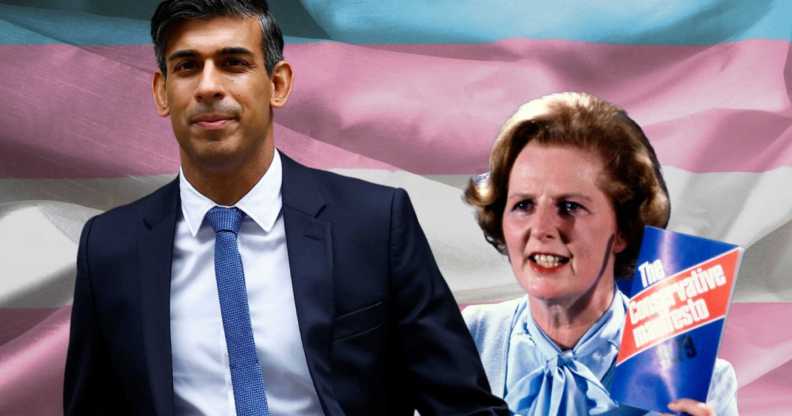Natasha Devon: Trans panic risks taking sex education back to the days of Section 28

‘I believe our greatest weapon in this fight is to remember how bad it used to be. We have to learn from the mistakes of our past.’ (Getty Images)
'I believe our greatest weapon in this fight is to remember how bad it used to be. We have to learn from the mistakes of our past.' (Getty Images)
Today’s young people deserve better than the sub-par sex ed we received in the early ’00s, but transphobic rhetoric from politicians and media outlets is putting progress at risk, LBC’s Natasha Devon writes.
The early 2000s are having something of a renaissance right now, but it wasn’t all dancing to “Hey Ya” whilst wearing a coin belt and drinking Smirnoff Ice. Sex Ed was dire.
It was your mortified maths teacher instructing you to put a condom on a banana – and that’s if you were lucky. That’s one of the themes I explore in my novel Babushka, which is set at the turn of the century.
I was 17 years old the first time I ever heard anyone use the word ‘bisexual’. It was the late 90s and I’d been cast as Antonio in my school’s production of Shakespeare’s The Merchant of Venice, directed by a legendary teacher called Doctor Cochran.
“Of course,” DC had said, “Bassanio is in love with Antonio as well as Portia. He is bisexual, as many intelligent people are.”
I remember so distinctly the feeling of being seen. Of course, I was then confronted by a world of pop culture which presented bisexual women as fakers, vying for the attention of straight men by fulfilling their porn-inspired lesbian fantasies, but that didn’t take away the relief of being acknowledged in that moment. It lessened the shame I was carrying.
I went to school during Section 28. This legislation was introduced by Thatcher in the late ’80s and made it illegal for teachers to ‘promote’ homosexuality. In reality, it meant LGBTQ+ people were never mentioned within school walls, LGBTQ+ history was effectively erased and homophobia often went unchallenged in a setting where all young people should feel safe.
When Section 28 was repealed in 2003, I thought the experiences of generations of traumatised queer people and their families would be enough to ensure we never saw the like return in my lifetime. Of course, I didn’t reckon for our current political climate or how central transphobia would be in the culture wars.
When media outlets and politicians began relentlessly targeting trans people, those old enough to remember warned us it was recycled homophobia. “It’s a mental illness!” “It’s a fetish!” “It will confuse children!”
These were all arguments gay men who lived through the 1980s were only too familiar with. “If a man is allowed to marry another man, soon he will want to marry his dog” became “pupils are identifying as cats!”
“What if teenagers think they’re gay and do something they’ll regret?” became “schools are transing children!”
The result has been a moral panic about trans ‘contagion’ which has, inevitably, impacted our entire community. Transphobia was the vulnerability point through which hatred of anyone non-cishet could gain entry in public discourse and flourish. And, like clockwork, once again we find ourselves debating whether LGBTQ+ people should be talked about in schools.
A parliamentary petition to remove LGBT content from relationship education has received just shy of a quarter of a million signatures. At the time of writing, politicians intend to host a debate about it which will roughly coincide with the publication of a long-awaited review of RSHE (relationships, sex and health education) in England.
Whilst a review of RHSE is not, in of itself, a terrible thing, there are justified concerned around what motivated it. In March 2023, Rishi Sunak reassured Miriam Cates MP during PMQs that her concerns that “how to strangle your partner safely and 72 genders” is “what passes for sex education in British schools” would be answered by the review.
Education secretary Gillian Keegan subsequently wrote to every school reminding them that parents have a right to advanced sight of sex ed lesson plans and to remove their child if they think them inappropriate (what an absolute gift for abusers, that is).
My greatest fear is that we are heading back to a time like the one I came of age in. Sure, media has changed since and become more inclusive. But there’s also a whole world of porn out there doing some dubious education of its own.
Plus, what about the young people who aren’t allowed to watch, or don’t have access to, shows like Sex Education and Heartstopper?
I believe our greatest weapon in this fight is to remember how bad it used to be. We have to learn from the mistakes of our past.
Natasha Devon is a writer, campaigner and LBC presenter. Her second novel, Babushka, is available to pre-order here.

